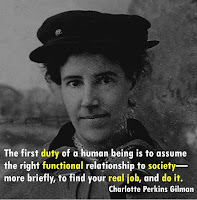Over the past few years, I have attempted several retellings of the classic Herland by Charlotte Perkins Gilman. On the one hand, I consider the book to be one of the more interesting and substantive "modern" (1915) utopia novels. On the other hand, like with all utopia novels, it suffers from the burden of its own premise.
The posts here address problems with utopias. Each post is connected to one or more chapters in my tribute/critique of Herland, His in Herland or Astyanax in Hiding.
First, however, I had to face the issue that it may not be possible to argue with the utopia-mindset at all:
The best explanation of this issue comes in a mystery novel by Dorothy L. Sayers, The Documents in the Case. The story is told through letters, reports, newspaper articles. One of the reports, written by the murderer's flatmate, John Munting, contains this insightful passage: [Lathom] is a real creator--narrow, eager, headlong, and loathing introspection and compromise. He questions nothing; I question everything...I cannot settle and dismiss questions, as he does, in one burst of inspired insight or equally inspired contempt...It was my fault that I did not help Lathom more, for, just because of my uneasy sensitiveness, I understood him far better than he ever understood me. It would have suited him better if I had violently disagreed with him. But I had the fatal knack of seeing his point and cautiously advancing counter-arguments, and that satisfied neither of us.
I have encountered a similar problem when faced with "no, no, Kate, this is the way life is" seamless narratives/theories from people on both the right and the left.
I cannot agree with them, but I also fail to argue adequately because the response, "But life is more complicated than that--if you research any given time period, you will discover that your theory loses credence and even falls to pieces, especially when you look at history through the experiences of the individuals who actually created it"...comes across as waffling.
Granted, I am personally drawn to pundits and thinkers who allow for nuance and variety. And I like to think that those pundits and thinkers win in the long-run.But can one really argue, in the short run, with the "life is this an unarguable seamless theory" mindset?
In my master's program, one of my fellow students would make "life is seamless" arguments, usually by utilizing a shallow version of Marxism that seemed mostly comprised of blame and Marxist terminology. (Not that Marxism offers much--but her narrative was trite, even by Marxist standards.)Nowadays, the student would likely wield a trickle-down version of CRT. And, unfortunately, these days, the student might be given more credence than when I attended classes over a decade ago. When I attended classes, the proclamation, "Those workers only said those things because they were brainwashed by the authoritarian establishment" was met with a kind of awful silence. The rest of the students--most of whom were quite leftist--would then move the conversation back to more intelligent ground: let's listen to the workers rather than reducing them to a "poor" group to be pitied, labeled, and disposed of.
I could never figure out whether I should argue with the "I have life all figured out and under my thumb because I have a theory" student or not. It seemed to me that the only person who could argue with her was a right-wing pundit. The two could batter each other with conspiracy theories disconnected from individuality. Everybody in the past was... They could toss labels and derisive comments at each other.Chapter 1



























